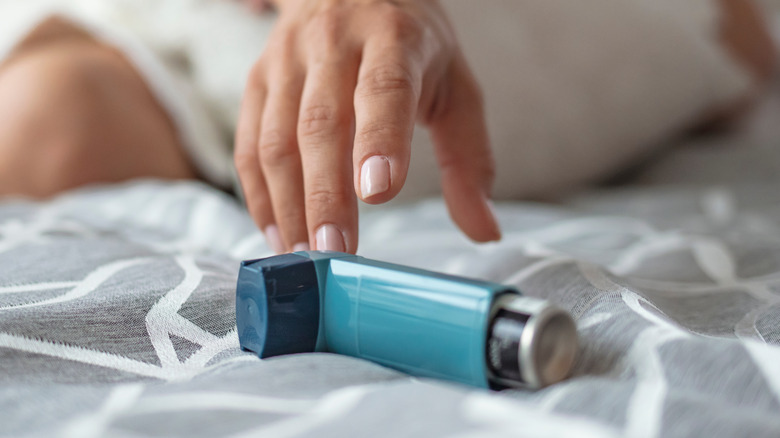When You Use An Inhaler Too Much, This Is What Happens
Inhalers are a real blessing for people with asthma, a respiratory condition that causes severe inflammation in the lungs. It's a common illness affecting both adults and children. According to statistics reported by the Asthma and Allergy Foundation of America (AAFA), more than 25 million people living in the U.S. currently have asthma, of which an estimated 20 million are adults.
Although there's no proper cure for asthma, inhalers offer relief to a certain extent from painful symptoms like shortness of breath, coughing, and wheezing, per the U.K. National Health Service (NHS). They are used to help manage these symptoms and prevent life-threatening severeness. Hence, being a vital source of breathing assistance, inhalers are a major necessity and an everyday accessory for asthmatics.
There are various kinds of inhalers. Some offer long-term asthma management to prevent serious attacks, while others are meant for temporary relief during an asthma attack (via NHS). While inhalers are crucial for many asthmatics, there may be consequences when an inhaler is used too much.
Can you get addicted to inhalers?
According to WebMD, the most widely prescribed temporary-relief inhaler is albuterol. Most people using albuterol may wonder if they can develop an addiction to their inhalers. Luckily, you cannot develop an addiction to albuterol itself, but it's possible to become dependent on it. This holds for many other inhalers as well.
Addictive behaviors differ from dependence. According to Healthline, if you are addicted, you aggressively seek it out by any means, similar to an uncontrollable impulse with no regard for health or societal consequences. On the other hand, dependence is when you feel a controllable impulse to consume. It can be both psychological and physical. You may physically feel withdrawal symptoms when you skip consuming a certain drug, or you may find yourself randomly thinking about it.
While you can't become addicted to an albuterol inhaler, you may find yourself reaching for your inhaler simply out of habit or impulse even when you don't necessarily need it. This usually happens when your actual asthma medications fail to offer instant relief and you struggle with painful symptoms often. Reports Healthline, using too much albuterol can put you at risk of overdose.
How harmful is inhaler overuse
According to a 2015 study published in The Journal of Allergy and Clinical Immunology, albuterol overuse is mostly observed in asthmatics with severely mismanaged symptoms or frequent asthma attacks. Researchers revealed that albuterol dependence was more prevalent in elderly males who were either smokers or had co-morbidities.
The same study further explained that inhaler overuse can be seriously detrimental to health. You may be twice more at risk of asthma attacks if you become dependent on your inhaler, increasing the risk for emergency hospitalization. Coughing, rapid heartbeat, trembling, headaches, and shortness of breath are common side effects of inhaler overuse (via Mayo Clinic). Additionally, it may impact your muscles and lead to tiredness or lethargy.
If you notice your asthma symptoms go from bad to worse, avoid inhaling more than one puff, per the Mayo Clinic. Instead, be sure to discuss your condition with a doctor to devise a less-risky action plan for asthma management.



